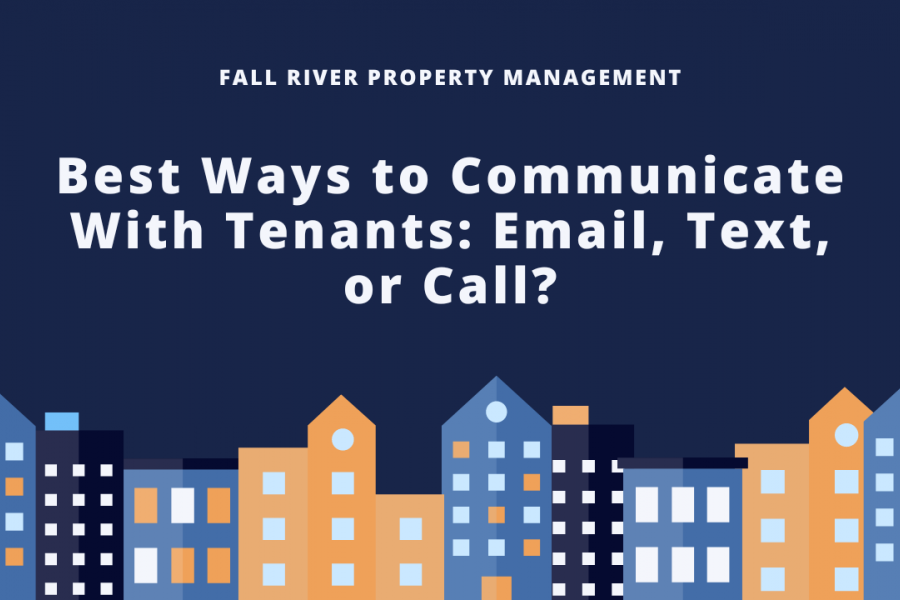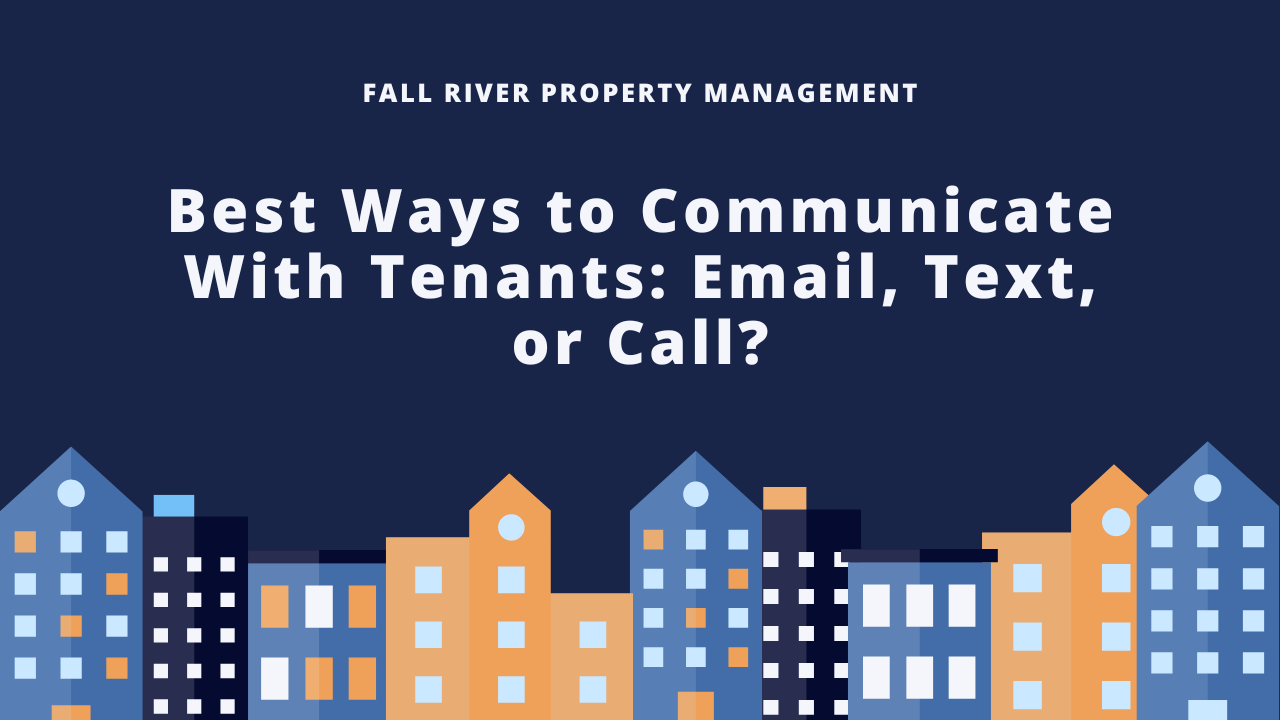
- Reasons Why You Need to Call Your Tenants
- Best Practices for Calling Your Tenants
- Are Phone Conversations Legally Binding?
- Reasons Why You Need to Email Your Tenants
- Best Practices for Emailing Your Tenants
- Are Email Notifications Considered Legal Written Documentation?
- Reasons Why You Need to Text Your Tenants
- How to Start Texting Your Tenants
- Are Text Notifications Considered Legal Written Documentation?
- Conclusion

Good communication is the cornerstone of successful property management. Whether you’re a landlord or a property management company like Fall River Property Management, effective communication with tenants is crucial for maintaining tenant satisfaction, resolving issues promptly, and ensuring the smooth operation of rental properties.
However, the question of: what is the best mode of communication; email, texting, or calling? In this article, we explore the advantages and best practices of each communication method to help property owners make informed decisions.
Reasons Why You Need to Call Your Tenants
- Urgent Matters: Urgent situations like burst pipes or security concerns demand immediate attention to prevent further damage or address safety risks. In such cases, a phone call ensures that the tenant receives the message promptly and understands the gravity of the situation.
- Complex Discussions: Certain matters, such as legal issues or intricate maintenance problems, require detailed explanations and discussions that may not be effectively conveyed through written communication. By engaging in a phone call, landlords can provide explanations, answer questions, and ensure a clear understanding of the situation.
- Personal Touch: Phone calls provide an opportunity for landlords to connect with tenants on a personal level, demonstrating empathy, understanding, and genuine concern for their well-being. By engaging in direct conversations, landlords convey a sense of accessibility and approachability that strengthens the bond between both parties.

- Immediate Feedback: In situations where clarity or immediate feedback is needed, phone calls offer real-time dialogue that allows for instant clarification and resolution. Tenants can ask questions, seek clarification, or provide feedback on the spot, enabling landlords to address any concerns or misunderstandings immediately.
Best Practices for Calling Your Tenants
- Be Professional: Maintain a professional tone and demeanor during all phone interactions with tenants.
- Leave a Detailed Voicemail: If the tenant is unavailable, leave a detailed voicemail outlining the purpose of your call and how they can reach you.
- Add a Personal Touch: Address tenants by name and demonstrate empathy and understanding when discussing issues.
- Only Call During Business Hours: Respect tenants’ privacy by limiting non-emergency calls to business hours unless it’s an urgent matter.
Are Phone Conversations Legally Binding?
While phone conversations can serve as valuable documentation of communication, they may not always be legally binding. It’s essential to follow up on important phone conversations with written documentation to avoid misunderstandings or disputes.
Reasons Why You Need to Email Your Tenants
- Documented Communication: Email provides a tangible record of communication between landlords and tenants, offering a clear trail of agreements, requests, and notices. This documented history can be invaluable in case of disputes or misunderstandings, serving as evidence of what was communicated and agreed upon

- Convenience and Accessibility: Landlords and tenants can access emails from any device, making it a practical tool for those with busy schedules or unavailable for calls. Email allows for asynchronous communication, enabling responses at their own pace without the need for immediate interaction.
- Clarity and Detail: Email allows landlords to convey complex information clearly and attach documents like lease agreements or inspection reports, reducing misinterpretation. This ensures tenants have necessary information and understand their rights and responsibilities, minimizing misunderstandings.
- Archival Purposes and Compliance: Emails provide a reliable history of communication, helping landlords in tracking maintenance requests, rent payments, and lease agreements. This helps comply with legal requirements by offering timestamped records and demonstrating adherence to regulations and obligations.
Best Practices for Emailing Your Tenants
- Clear Subject Lines: Use clear and concise subject lines to indicate the purpose of the email.
- Professional Tone: Maintain a professional tone and use proper grammar and punctuation in all email correspondence.
- Provide Context: When sending notices or instructions, provide sufficient context to ensure clarity and understanding.
- Prompt Responses: Respond to tenant emails promptly to demonstrate responsiveness and foster positive communication.
Are Email Notifications Considered Legal Written Documentation?
Yes, email notifications are generally considered legal written documentation, provided they meet certain criteria such as clarity, specificity, and confirmation of receipt. However, it’s advisable to check local laws and regulations regarding the use of email for legal notices.
Reasons Why You Need to Text Your Tenants
- Immediate Communication: Text messages offer instant communication, making them ideal for urgent matters or quick updates.

- High Open Rates: Text messages have a significantly higher open rate compared to emails, ensuring important information reaches tenants promptly.
- Concise Communication: Text messages are best suited for brief, to-the-point communication, such as appointment reminders or maintenance updates.
- Preferred Communication Method: Many tenants prefer texting for non-urgent matters due to its convenience and ease of use.
How to Start Texting Your Tenants
- Obtain Consent: Before initiating text communication, obtain consent from tenants to ensure compliance with privacy regulations.
- Use a Professional Platform: Utilize property management software or messaging platforms designed for business communication to maintain professionalism and organization.
- Respect Privacy: Only use text messages for non-urgent matters and avoid sending messages outside of working hours.
- Provide Opt-Out Options: Offer tenants the option to opt out of text communication if they prefer other methods of contact.
Are Text Notifications Considered Legal Written Documentation?
Text notifications can serve as legal documentation, but their validity may depend on various factors such as content, context, and acknowledgment of receipt. While text messages can provide valuable documentation of communication, it’s advisable to supplement important messages with formal written notices when necessary.
Conclusion
Effective communication is essential for successful property management, and Fall River Property Management understands the importance of choosing the right communication method.
Whether it’s through phone calls, emails, or text messages, Fall River Property Management prioritizes clear, timely, and professional communication with tenants to ensure their needs are met and properties are well-maintained.
Following these best practices and leveraging modern communication tools, Fall River Property Management helps property owners streamline communication processes and foster positive relationships with their tenants, ultimately enhancing the overall rental experience.
Contact Fall River Property Management to get started!